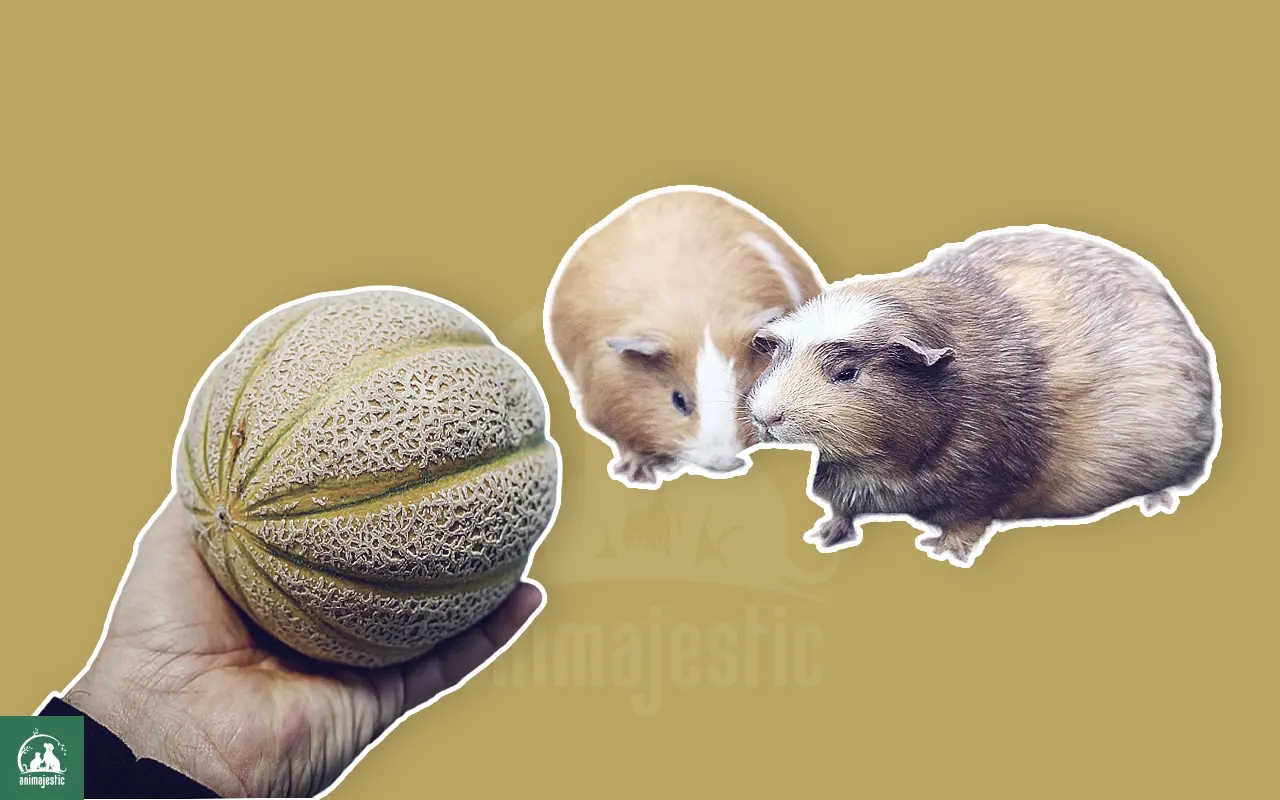You’re a proud owner of a guinea pig who hops, purrs, squeals, or twitches their nose in the most adorable manner possible. But beyond the love and care you take of these cuddly creatures, the responsibility of feeding them right bears heavily upon your shoulders.
Have you ever found yourself ponderously staring at a melon, wondering, “Can guinea pigs eat melons?” All too often, new guinea pig owners face a dilemma of sorts when planning their little ones’ dietary regimen.
As we put guinea pigs and melons under a dietary microscope, we’ll need to understand the nutritional make-up of guinea pigs and melons. Is there overlap? Can the well known hydrating fruit fit into a guinea pig’s diet?
Let’s dive deep and find out.
Guinea Pigs Dietary Needs
Before understanding if melons can befriend guinea pigs’ diet, an understanding of the guinea pigs’ dietary profile is essential. Here is a quick breakdown of what a healthy guinea pig’s diet usually includes:
- Hay: This forms the crux, the bulk of the guinea pig’s diet, aiding in proper digestion and maintaining dental health.
- Pellets: High-quality pellets, preferably made from Timothy hay, supply essential vitamins and minerals.
- Fresh Veggies and Fruits: They play a supplementary role, providing hydration and extra nutrition but should not replace the primary diet.
With this broad understanding of a guinea pig’s dietary needs, let’s turn our gaze to the juicy and aromatic melons.
The Juicy Tale of Melons
Touted as the summer’s gift, melons bring a splash of refreshment, flavor, and vital nutrition. Here’s what hides under their thick rinds:
- Water: The queen of hydration, melons, mainly consist of water—about 90%.
- Sugar: They contain around 6% of natural sugars.
- Fiber: A serving of 100g of melon provides around 0.9g of dietary fiber.
- Vitamins & Minerals: Melons are abundant in Vitamin A and C and hold traces of potassium and B vitamins.
Connecting the dots between the guinea pigs’ diet and the melon nutrients, can we conclude if they are meant to be together?
Can Guinea Pigs Eat Melons?
Brace yourselves for a delightful answer – YES, guinea pigs can eat melons! The juicy fruit offers hydration and essential nutrients beneficial for the guinea pigs.
However, the high sugar content necessitates stringent portion control. Amid the excitement, it is paramount to treat melons as an occasional sweet deal rather than an everyday affair.
Pros and Cons of Melons in the Guinea Pig Diet
Incorporating a new element, like melons, into a guinea pig’s diet comes with its advantages and challenges. Let’s explore both sides of this fruity equation.
Potential Benefits
When served appropriately, melons can be beneficial to guinea pigs:
- Hydration: Packed with water, melons offer an excellent source of hydration for your furry friends.
- Vitamin Boost: The Vitamin C content in melons contributes positively to a guinea pig’s diet since guinea pigs can’t synthesize their own Vitamin C.
- Refreshing Flavor: The introduction of melon as a treat can break the monotony of your guinea pig’s diet.
Potential Downsides
However, melons also carry a few potential negative impacts:
- High Sugar Content: The natural sugars in melons, while delicious, could lead to weight gain and other health issues if fed in excess.
- Allergies or Digestive Troubles: Like other foods, some guinea pigs might be allergic to melons or experience difficulties in digesting them.
How to Introduce Melons to Guinea Pigs
Now that we’ve established that guinea pigs can eat melons, here are some things to keep in mind while serving this juicy treat:
- Slow Introduction: Like with any new food, start with small portions of melon to see how your guinea pig responds to it.
- Occasional Treat: Given their sugar content, melons should be an occasional treat, not a routine dietary element.
- Watch Out for Reactions: Always observe your guinea pig after feeding them melons and watch for any signs of discomfort or changes in their droppings.
Dietary Alternatives to Melons
While melons can serve as an occasional treat, it’s important to introduce a variety of safe, nutritious foods into your guinea pig’s diet.
- Veggies: Green bell peppers, cucumbers, or leafy greens can provide essential nutrients and hydration.
- Other Fruits: Apples (without seeds), blueberries, and pears served sparingly can provide a refreshing change.
Maintaining a Balanced Diet for Your Guinea Pig
The path to a balanced diet doesn’t have to be riddled with complications. Here are some simplified guidelines:
- Hay First: Ensure that the major part of your guinea pig’s diet consists of quality hay and a smaller portion of Timothy hay-based pellets.
- Treat Fruits as Extras: Think of melons and other fruits as bonus items rather than primary components of the diet.
- Sugar in Check: Make sure sugary foods, including melons, are given in moderation.
- Monitor and Consult: Keep an eye on any changes in the guinea pig’s health after introducing a new food and always stay in touch with your vet for advice.
Conclusion
Looking back at our question, “Can guinea pigs eat melons?” The answer is as delightful as the fruit itself. Yes, they can, but the portions should be limited due to the high sugar content.
As a guinea pig owner, you strive to provide a balanced diet to your furry friend. While treating it with a slice of melon, remember to keep its diet diverse and nutrition-focused. The joy of responsibly maintaining a guinea pig extends beyond food—it’s about understanding and implementing conscious choices for your guinea pig’s health.
Every little step, whether introducing a fresh food, controlling portions, or monitoring the aftermath, contributes significantly to you being a better pet parent.
So, the next time you feed your guinea pig a piece of juicy melon, relish the moment, knowing you’re offering a safe, nutritious treat, a reward to an already healthful and balanced diet.
